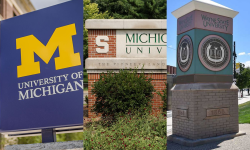Opinion | Michigan’s free college tuition isn’t serving all our residents
Slowly but surely, Michigan is overcoming its rust belt image with a newly blue political landscape, a governor shortlisted for national office, and a climate that makes the state one of the few places people wanted to be this summer. Yet despite the state’s many assets, Michigan struggles to attract new residents and keep its own young people in the state.

Responding to recent studies revealing Michigan’s lack of population growth, Gov. Gretchen Whitmer charged a high-powered Commission with mapping a strategy for the state to attract newcomers and talent, while keeping our own young people and current residents from fleeing to perceived “greener” pastures.
Gov. Whitmer and the Michigan Legislature had already made some bipartisan moves to better equip Michigan residents with the skills needed for them to help themselves. They have worked hard to make Michigan employers competitive and the state more attractive to business development. Whitmer has set a goal of 60 percent of Michigan residents achieving a vital postsecondary credential by 2030. And programs like the Michigan Achievement Scholarship and Michigan Reconnect seek to make community colleges and postsecondary credentials more accessible and affordable to more residents.
Today the link between higher education and training and local economic development has never been more firmly drawn. Communities and states that prepare and are home to higher skilled and better educated citizenry see higher per capita incomes, business and job growth, and are more attractive to employers seeking to invest, expand, or locate new businesses.
Against this backdrop it is clear that to lift talent attainment across Michigan and help all its communities grow again, policymakers will have to plug big geographic holes in the higher education opportunity landscape in Michigan. A new policy paper from the Upjohn Institute reveals that applications to Michigan Reconnect, which provides scholarships to community colleges for the state’s adults without degrees, varies dramatically from region to region and community to community.
Part of the challenge in making the Reconnect program widely accessible is the fragmented and decentralized structure of Michigan’s community college system. Only 33 of Michigan’s 83 counties, albeit 80 percent of the state’s population — are serviced by a community college. Residents of the other 50 relatively poorer and rural counties, who arguably stand to benefit the most from greater college availability, not only are more reliant on online classes (and broadband Internet availability), they also have received less aid from Reconnect because the program to date has paid only for “in-district” rates (although, this is scheduled to change beginning in the 2023 fall semester). Counties that have well-funded and highly attended community college districts, as well as those with existing local tuition-free college “Promise” programs, have experienced higher application rates for the Reconnect program.
If Michigan is to reverse its sluggish talent growth, and expand new hubs for business beyond just a handful of communities, it will need to make some adjustments to its higher education attainment strategy.
First, the state could just pay the full cost of tuition at any community college regardless of residency status. At the very least, officials should better publicize the changes made to the program, starting in the fall of 2023, that will allow some students with sufficient financial need to attend any community college tuition-free through a combination of other financial aid (applied first) and the Reconnect scholarship (applied last).
Second, to help students navigate the system, providing additional funding to hire more Reconnect Navigators—caseworkers who advise applicants through the college enrollment and career planning process—may help Michiganders navigate the complexities of attending college and finding the best path into the workforce. It may also help increase enrollment and completion rates, especially at institutions with fewer student support resources. Policymakers might also consider providing additional resources directly to community colleges to strengthen their student support systems. Reconnect navigators have limited access to student records and can only do so much to ensure that students register for classes and make progress towards a degree.
There is both a need and considerable potential for regions to work with business partners to develop pathways that lead to high-demand jobs, and mark Michigan as a state serious about providing a well-prepared workforce. Communities like Kalamazoo with its path-setting Kalamazoo Promise higher education guarantee provide blueprints for how these models can work for the state of Michigan.
Some changes to Michigan’s existing well-intentioned talent attainment programs can significantly expand participation and help put Michigan on the path to population and economic growth again.
See what new members are saying about why they donated to Bridge Michigan:
- “In order for this information to be accurate and unbiased it must be underwritten by its readers, not by special interests.” - Larry S.
- “Not many other media sources report on the topics Bridge does.” - Susan B.
- “Your journalism is outstanding and rare these days.” - Mark S.
If you want to ensure the future of nonpartisan, nonprofit Michigan journalism, please become a member today. You, too, will be asked why you donated and maybe we'll feature your quote next time!




